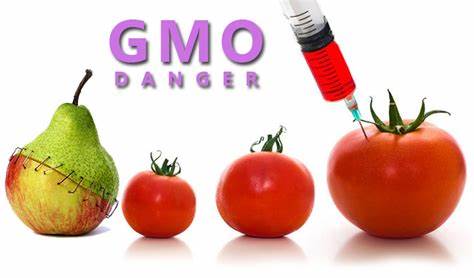If you’ve ever gone looking at the bac k of food labels, you’ve probably stumbled upon a description such as “Partially produced with genetic engineering,” “Contains a bioengineered food ingredient,” or a Non-GMO project verified label. But have you ever stopped to think about what this means?
k of food labels, you’ve probably stumbled upon a description such as “Partially produced with genetic engineering,” “Contains a bioengineered food ingredient,” or a Non-GMO project verified label. But have you ever stopped to think about what this means?
In short, GMO stands for genetically modified organisms. “A GMO, or genetically modified organism, is a plant, animal, microorganism or other organism whose genetic makeup has been modified in a laboratory,” according to the Non-GMO Project. A GMO can contain a combination of plant, animal, or bacteria genes not created naturally. The use of GMOs in food production has become increasingly popular, especially in recent years.
However, the practice of modifying organisms has existed long before modern times. Humans have been using breeding methods on animals for thousands of years with the hope of creating desirable traits However, there are disadvantages to this procedure. “Conventional methods of modifying plants and animals—selective breeding and crossbreeding—can take a long time,” said National Geographic. In addition, these traditional methods can produce mixed results, with unwanted characteristics also showing up. However, the specific method of creating GMOs is more effective because it allows scientists to target specific genes without the interference of other traits directly.
The most common appearance of GMOs is in the produce section. According to the FDA, the most common GMOs include corn, soybeans, potatoes, canola, and summer squash. Other common examples include papayas, apples, sugar beets, and cotton, used to make cooking oil.
GMOs have several benefits, but the main one applies to farmers. “For GMO crops that are resistant to insect damage, farmers can apply fewer spray pesticides to protect the crops,” said the FDA. In addition, herbicide-resistant GMO crops can allow farmers to control weeds without affecting the soil or disturbing the crops. Although GMOs were created to address farmers’ concerns, they can also benefit the consumer. Overall, GMOs tend to have longer shelf lives, are less costly, and can be more nutritious and tasty, according to MedlinePlus. For example, GMO apples were created to stop apples from browning when they are initially cut and keep them fresher for longer. This change also cuts down the food waste produced by apples. In addition, golden rice, a special variety of rice, was engineered to provide higher levels of Vitamin A to consumers, according to Medical News Today.
Producing GMOs is still a recently developed practice, so little is known about its long-term effects. Although there have been concerns about GMOs causing cancer, altering human DNA, or causing allergic reactions, there is little scientific evidence to back this up. However, there are still concerns about the ethicality of GMOs.
First, GMOs can cause changes to environmental biodiversity. Once a GMO has been released into the world and is circulating in the food chain, it is hard to retrieve or control it. In addition, not much is known about how GMOs will pass on their genes, influence other organisms, or affect the environment. It is also feared that GMOs can harm society’s well-being, by creating antibiotic-resistant bacteria, allergens, or diseases.
On the other hand, GMOs can also be unethical because another organism’s DNA is being altered. While some people believe that scientists should not be “tampering” with other organisms to benefit the food industry, others believe that GMOs are necessary to improve the quality of food and life.
Personally, I don’t completely agree with the assumption that GMOs are inherently harmful and can have detrimental effects on society. While there are risks to the production of GMOs, there are certain measures put in place by the FDA and government to prevent these situations from happening. However, I think scientists should still be cautious moving forward and not release too many GMOs to the public at once, which could have unintended consequences.
Although GMOs are a relatively new addition to the food industry, they have already been implemented in numerous ways. A portion of the produce we consume contains ingredients that come from GMOs or are made using genetically modified varieties of crops. GMOs can certainly enhance the nutritional value and taste of foods while decreasing the cost. While GMOs may raise ethical concerns over human safety, they are here to stay and can help developing countries with lower crop yields.












































































































































